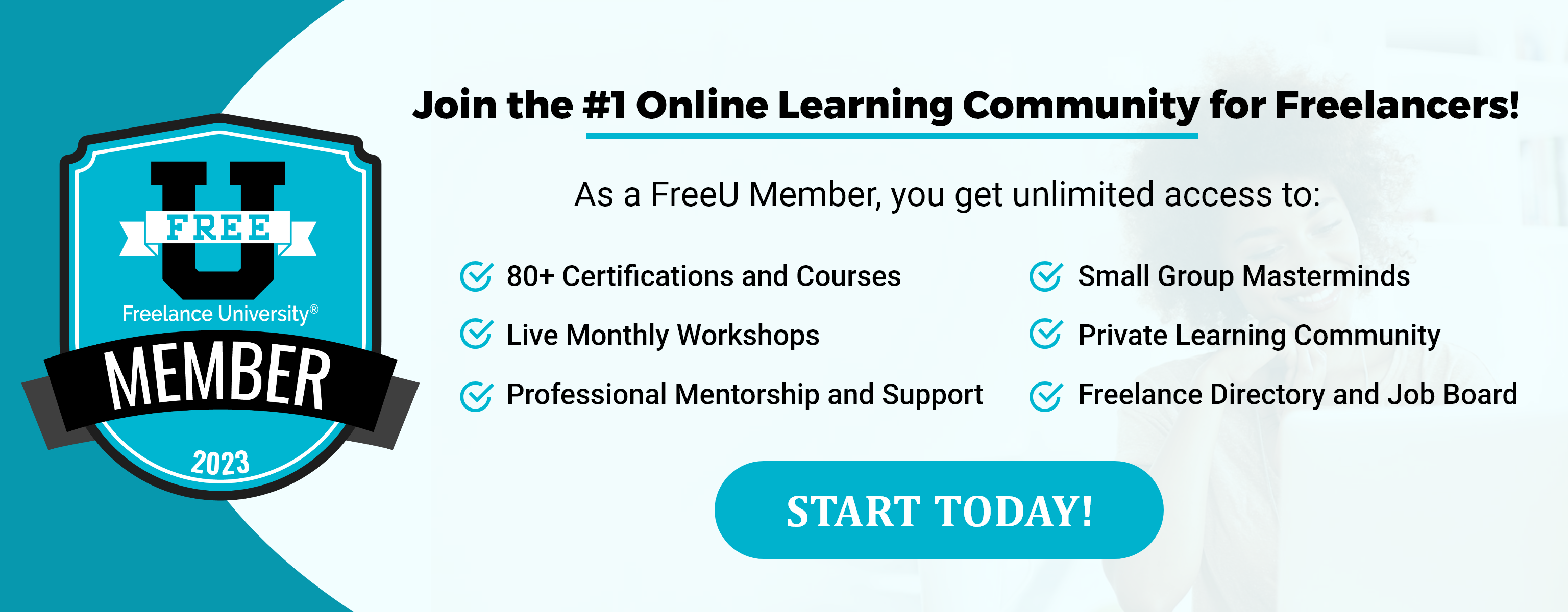How to Gain Experience (and Credibility) When You Have None!
By Jena Kroeker
Do you ever feel like you’re running a lemonade stand, and people either pass by or want free samples? Maybe you’re just starting out as a freelancer or virtual assistant, struggling to gain experience so you can build credibility with new clients. Maybe you’ve switched to a new niche and are desperate to convince clients of your new skills and services.
You may have a quality website and online presence on social media, but you feel like you’re being ignored. To gain experience, you need credibility, and to gain credibility, you need experience. It feels like a dilemma. And when you’re new, people sometimes treat you as a novice and expect discounts or free work.
A few years ago, I changed my niche from closed captioning to writing/editing. In my local network, my close friends and family who have known me the longest had the utmost confidence in my skills. One family member said that my writing was like Ernest Hemingway’s. Yes, that’s right, folks – Ernest Hemingway, author of A Farewell to Arms and The Sun Also Rises. You can read his books, or you can read my blog and have the same experience of great literature. 🙂
But then, just to ensure my ego didn’t get too inflated, I saw raised eyebrows and heard sceptical remarks from acquaintances who doubted my abilities. It was as if I had said I wanted to be a trapeze artist. I needed to demonstrate my skills in order to be believed. Since I was recovering from an injury, I used that time to start a personal blog and daydream. I knew I could write. I had always known I could write, ever since I was a kid. So, I started writing short posts about my life and showed them to my local network.
Everyone’s path is different, but the fact that you’re reading my words here means that I did eventually find clients who trusted me. Here are some other practical ways to gain experience in order to build credibility with new clients:
1. Start with your local network.
In a previous blog post titled “How to Find Ideal Clients (in Your Own Backyard),” we discuss how to tap into your current connections and local network. You can think of your local network as a series of concentric circles, with close family and friends in the middle, then colleagues, acquaintances, and local business owners in the outer circles:
“The people in the inner circle are the ones you know best. They may or may not need your services, but they can help you spread the word. The outer circles are people you may have to approach more formally yourself, or they may be referrals from your inner circle.”
As we say in the post, it’s important to define your niche and business structure as soon as you’re ready to start working. That makes it easier to network and helps attract more high-quality, relevant referrals. At the same time, it makes you appear more professional.
But a word of warning – When you’re just starting out, your local network may see you as a free or low-cost option. They may expect a “friends and family rate.” If your business starts becoming less profitable than you hoped, and you feel like you’re working hard but suffering financially, you may have a problem.
Corey Pemberton provides some valuable advice in his article, “How to Build Credibility As a Freelancer (Even If You’re Just Starting Out).” He says that continuing to negotiate and discount rates after landing the first few clients can hurt a freelancer’s credibility. Instead, he suggests using “consistent (and simple) rates” and warns,
“If you’re willing to discount your rates, you’re sending a message to clients that you’re unsure of your own value. Your lack of confidence in your abilities translates into a client’s lack of confidence in you.”
Later in this post, we’ll discuss some ways to set boundaries around free or discounted work so that you don’t fall into the trap of working for free over the long term.
2. Share your education with your target audience.
At Freelance University, we often talk about the importance of lifelong learning. As students pursue certifications, courses, and workshops, they build credibility and add value to their businesses. Admitting you need to update or add new skills provides an instant boost of credibility. Potential clients who know that you’re accessing training understand that you’re not content with the status quo. You want to provide the most up-to-date services available.
That’s why it’s important to showcase any credentials on your website and on social media. If you have a Facebook Page or belong to a Facebook group, celebrate your certifications as you earn them. Talk about what you’ve learned and how it’s enhancing your services.
In her article titled “Building Credibility As A Freelance Writer,” Katie Jenison shares an excellent example:
“A client is looking to increase conversion rates on their sales page. While comparing two copywriters, the client notices one has been certified in conversion copywriting. Exactly what the client is looking for! Which copywriter do you think the client picked?
“The certified conversion copywriter, of course.”
She also suggests creating educational free content for your target audience to position yourself as an industry expert. If you haven’t landed a client yet, you could use your new skills on your own business, and then share your process on social media or as a free offer. For example, if you’re a web designer, create your own website and then write a PDF guide on how you did it. If you’re a writer, start a blog and provide writing advice. Jenison also mentions webinars and email courses as great options for boosting credibility.
Allie Decker provides a unique suggestion in “The Ultimate Guide to Freelancing.” She says,
“One freelancer I know tutors writing students at her local library. Will any of her high-school-aged clients hire her? Probably not, but it still builds awareness of her business while helping others and challenging her to fine-tune her skills.”
3. Offer free or discounted services for a limited time.
Now we’ve entered territory that should have a “Caution” sign. Tread carefully, because free or discounted services can reduce credibility, especially when you’re new. Remember not to sell yourself short or undervalue your skills. Never mind the raised eyebrows and sceptical looks. You never know exactly what people are thinking. Some may be envious of your courage to step into the freelance world. They’re uncomfortable with your belief in yourself.
If you feel you could gain some valuable experience by offering free or discounted services, plan to do so for a limited time. And be sure to communicate to potential clients that this discount won’t last forever. Here are some more strategies you can use:
• Price your services ahead of time and create hourly, project, or retainer packages that include certain tasks.
• Figure out how much of a discount you can afford without undermining your skills or enduring financial hardship.
• Decide how many free projects you are willing to provide and ask for a testimonial in return.
Jenison’s article suggests only negotiating rates on the first two to three projects. She says, “Once you’ve gotten a few client testimonials and portfolio pieces under your belt, stay firm on your rates. The more you believe in the value of your work, the more they will too.”
And the HubSpot article above shares this eye-opening quote that encourages all of us to respect our own expertise:
“[The best decision I made as a freelancer was when] I went through a period of saying yes to everyone that asked for help. It wasn’t until I started to respect my expertise that others seemed to, too (minus the example from above…). It’s easy to fall into that trap, but if you don’t appreciate your time and talent, neither will anyone else.” — Lauren G., PR and Prose, Amsterdam
4. Volunteer for nonprofits.
In a recent FreeU Virtual Office Hours session, co-founder Craig Cannings advised freelancers not to volunteer for businesses. There might be internships, but it’s important not to provide too much pro bono work to businesses that do have money to pay. They might start taking advantage of free or low-cost work. The only thing worse than having no one hire you is having people say, “I’m so glad I could hire you. A professional would have cost me X dollars.”
But volunteering for nonprofits is a great way to build credibility and open the door to possible paid opportunities. When you share your skills with a cause you believe in, your passion and enthusiasm shine. And you might become so indispensable that the nonprofit decides to create room in their budget to pay you for your services. Even if the nonprofit itself doesn’t hire you, other potential clients will be impressed with your commitment to benefiting society.
Here are some strategies to make the most of volunteering without falling into the trap of working for free long term:
• Be firm about your niche and the credentials you have that make it a billable skill.
• If a volunteer position becomes a paid project, insist on having a formal contract.
• Be firm about boundaries – how long you’ll provide free work, and if you’re eventually hired as a freelancer, designate what will be considered volunteer work (if you continue a volunteer role) and what will be considered paid work.
• Nonprofits always have needs, and as much as you care about the cause, don’t let the nonprofit choose your niche for you.
In an article titled “Freelancers: It’s Okay to Say No,” Bridget Willard says,
“Working from home may seem less important somehow and often others view your time as more flexible or, frankly, less valuable. When it comes to volunteering, it’s important to protect your business by protecting your time. This also includes your volunteer time.”
She suggests volunteering for 10% of your total work hours, or however many hours works for you. As an example, she discusses WordPress as an Open Source Project that relies on volunteers. When people’s employers allocate time to Open Source Projects, sponsoring the volunteer work, the businesses and corporations assume the financial risk instead of the volunteers themselves. But when freelancers volunteer, the time is financially, mentally, and physically more expensive.
As FreeU co-founder Craig Cannings has said in many training sessions and articles, “You are better than you think!” Your business is more than just a lemonade stand; you are a skilled virtual professional. Above are a few strategies you can use to gain experience and credibility when you have none. But the most important thing is to believe in yourself.
And now we’d love to hear your thoughts! How have you gained experience in your freelance or virtual assistant business and boosted your credibility with new clients? Please share any questions or advice in the comments below.









































































































